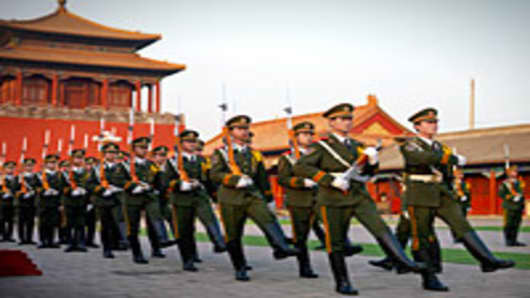When the Chinese authorities are bailing out local governments for $463 billion, or the equivalent of one and a half TARPs when adjusted for gross domestic product, there could be big problems ahead, according to Societe Generale’s Dylan Grice.
"This is the starkest evidence yet of China’s 'industrialization by suppression'. Yet numerous past experiences have clearly demonstrated suppression buys only short-run stability at the cost of long-run fragility,” said the global strategist in a research note.
“The world should be worried. Booms fed by excess demand, fueled by capital markets distorted by policymakers beguiled by their own hubris. Well, they’re nothing new, are they?,” he said.
Grice questioned the ability of groups of economists at, for example, the Federal Open Market Committee (FOMC) to set interest rates instead of the market, and said he is worried about the implications of distorting the market for capital.
“Today it is widely believed that committees of academics, the foremost of which is the FOMC, make better decisions,” said Grice.
“The markets themselves are not to be trusted with such an important price as that for capital. Consequently, we are as blessed with such committees as we are with the inflationary fruits of their toil and wisdom,” he said.
Having watched central bankers across the world keep rates low, Grice believes that they are now struggling to come to terms with the implications of a natural rate of capital.
“In recent decades many such committees have found themselves in difficult situations. After lowering rates for one reason or another, they grew fearful of the instability that might ensue if rates were allowed to rise to their natural rate too quickly. What to do?" he said.
“They pressed their index fingers hard into the temples of their heads, closed their eyes and meditated. They summoned their years of collective experience wrestling with problems as profound as 'the computational complexity of rationalizing boundedly rational choice behavior' and 'equilibrium theory with satiable and non-ordered preferences' before finally, with furrowed brows and straight faces issuing their pronouncement to lesser members of the financial community: it would be much better, for the economy, to keep the rate of interest below its natural rate,” Grice said.
The result of all this was credit-fueled growth which proved, in Grice’s opinion, to be illusory.
“It was fun while it lasted, at least while no one realized it was just credit inflation. Few knew how much was real and how much was illusory, and fewer cared, until they did,” he added.
Economic Suppression
Describing this push for lower rates as economic suppression by committee, Grice pointed to Japan in the 1980s, Thailand in the 90s and Spain and Ireland in the mid-2000s as prime examples of failure to give a market price to the cost of capital.
“It will end in the same way. Suppression by committee always does,” said Grice.“Of course, China is different. It has unparalleled administrative control over its economy. Therefore, its suppression is greater than anything any industrializing economy has yet managed.”
“But why will suppression work this time? Is having tighter control of the levers the same as having tighter control of the machine?” Grice asked. He added that he might be able to get a tight grip on a plane but still not know what he is doing with the lever.
“The economic machine is no different. No one really knows how it works, at least not with the precision required to smooth out its natural fluctuations. I don’t, you don’t, our central bankers don’t, and the men in grey suits, who control China’s economy, don’t either,” Grice said.
“Their use of the levers might suppress volatility for a time and give the impression of stability, as it did during the great moderation, but like everything else in China, where the private sectors isn’t private, the bond market doesn’t price risk, and the Communist Party isn’t communist, appearances can be deceptive,” he said.
Pointing to that $463 billion bailout of bad loans made to the Local Government Financing Vehicles, Grice points out his fears over the impact of throwing such huge amounts of money around.
“China’s government throws money at a problem, problem goes away. Boring story, move on. But the problem hasn’t gone away. Think carefully about what’s just happened. A bail-out of $463 billion is half the size of the TARP, introduced by Paulson at the nadir of the 2008 crisis, for an economy which is only one-third the size of the US,” he said.
“If we calibrate the magnitude of the economic crisis with the size of the bail-out, one and a half TARPs implies a financial crisis one and half times the order of magnitude of 2008,” he said.
“Maybe China has dodged the crisis. In doing so, maybe it’s even just demonstrated the superiority of its model. But I doubt it. For what is its model? More suppression than has ever been seen before?” said Grice.



